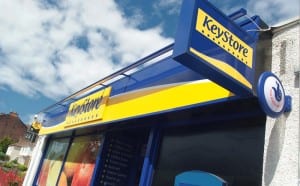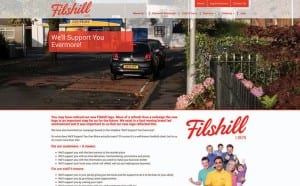SG INTERVIEW
 GLASGOW- based wholesaler JW Filshill triumphed in the Scottish Wholesale Achievers awards programme in February, winning every category that it entered and taking the coveted Champion of Champions title.
GLASGOW- based wholesaler JW Filshill triumphed in the Scottish Wholesale Achievers awards programme in February, winning every category that it entered and taking the coveted Champion of Champions title.
It was the latest event in a busy period that has included the family firm’s 140th anniversary last year and the launch and development of its domestic and international beer operation Craft Beer Clan. Imminently it’s launching a new format in its family of KeyStore symbol stores, a move that’s closely linked to its growing EPOS operation. And there’s more in store. Patrick Duffy met up with Filshill managing director Simon Hannah (pictured) to hear the plans.
THERE’S plenty for JW Filshill managing director Simon Hannah to be upbeat about. The company had a great night at the Scottish Wholesale Achievers awards event recently, it has developed into a multi-faceted firm that includes growing export interests in craft beer and other goods and it’s about to embark on an exciting new project in its KeyStore symbol group.
On the other hand he’s keen to be realistic about the current economic environment; it’s tough and extremely competitive for everyone in the food and drink supply chain – suppliers, wholesalers and retailers – and new developments are bringing hefty new challenges.

One is the National Living Wage, the new enhanced minimum rate that’s introduced this month for workers over the age of 25. Filshill the wholesaler is hardly affected directly in the first instance, he explained, it has only a couple of ancillary workers who will go on to the new rate. But he’s concerned about the effect on retailers and others in the chain.
The company has two KeyStore shops, in part to be able to trial new products and techniques and also to better understand retail opportunities and pressures, and it has been running a National Living Wage calculator over one of them.
“We’ve done some sums on one shop and if we assume that the margin will remain the same our turnover will need to increase by £55,000 next year to cover it.
“The challenge is that we have guys on supervisory levels who could say ‘I used to get an extra £1 an hour for managing these guys and now its only 50p’. So it’s not just the impact at the front end, there’s a shockwave that moves up the salary scale.”
“It’s not just the impact at the front end, there’s a shockwave that moves up the salary scale”
On the other hand Hannah has a determined ‘glass-half-full’ outlook on business and he reckons he can see a possible NLW upside for certain types of wholesaler.
“I’m always looking for positives,” he said.
“The retailers will have to work more hours themselves though I don’t know how they do that, these guys are working 70, 80 or 90 hours a week already.
![KeyStore Renfrew store till point007[14]](https://www.scottishgrocer.co.uk/wp-content/uploads/2016/03/KeyStore-Renfrew-store-till-point00714-300x186.jpg)
“So I think this could accelerate movement back to delivered wholesale. The guy’s not going to be out of the shop for 10 hours a week doing cash & carry runs.”
But NLW is he reckons just the latest economic pressure. Another, again in both wholesale and in local retail, is pressure on margins. He has run the family company for five years since taking over from his dad but he has spent 17 years to date with the firm. Go back 10 years, he said, and the percentage of items in a shop that had a price mark would be small, certainly below 10%. Today a typical c-store could have 40% or more stock price-marked. Some products that you would never have expected to carry a price mark, like wine, now do.
And that means, effectively, that a huge proportion of a c-store’s range has had the margin pre-determined.
Also, he said, a number of product categories that traditionally provided footfall – such as tobacco and news – are in steep decline and other categories previously intended to achieve decent margin have had to be pushed into that footfall-driving role.
So what’s the answer? Well a major part of it could be, he reckons, technology – or more specifically the use of EPOS to provide valuable data.
“The upscaling of resources is an important part of our plan for growth”
In a PMP-influenced world that also features other pressures, ways are going to have to be found to give retailers more, he said.
“There are other ways of releasing margin and that’s some of the opportunity we see. We now have 70 of our KeyStore stores operating the ReScan EPOS system and there are a further 60 stores that have other systems.”
There are around 170 KeyStore outlets so that is, he suggested, a high proportion.

“That’s enough scale now to talk to out suppliers about how we utilise the data,” he said.
“I’ve always been a big advocate of using technology as a way of driving a culture of compliance. You make it very clear to every one of your customers that if you are in a position to, and want to, share your data with the supply chain there will be enhanced margin for you.
“If you’re not prepared to do that then you’re giving up that extra 2%, 3% or 4% margin that is sitting there for others.
“So that’s a strategy we’re pushing quite hard this year.”
He sees the ReScan EPOS system as “brilliant”. Filshill offers two versions – one basic, one that’s more sophisticated – and he knows well that retailers vary a great deal in their reaction to technology. Some want it for just a few tasks, others are very IT-literate and learn how to use it to provide very effective management tools.
Back at Filshill the company can use collected data to carry out analysis through its own business intelligence system.

Primary schools close to KeyStore stores are, for example, being asked to apply for funding for anything from support at a school sports day, to funding sports teams strips, planting trees, creating fruit and vegetable gardens, or organising holiday meals programmes.
“Basically you can slice and dice the data any way you choose. Until now a read on independent Scottish convenience has been virtually non-existent. Suppliers are being asked to put resource in place for a part of the sector when they really don’t know. We need to provide a good spread of data across different geographical locations in Scotland, which is something we have at KeyStore.”
While the proposal is ‘data share in return for extra margin’, the margin will be for the retailer, he was keen to stress.
“We don’t anticipate taking any of that margin, to be honest. We see this as a model that will drive other interested customers towards our business.
“The good news about the ReScan EPOS system is that we will put them in free on loan. You know, a two-till system could cost something in the region of £5,000 –£6,000 if you were to go out and buy it.”
It’s interesting that an installed ReScan EPOS system will be one of the required criteria for the company’s latest KeyStore format. Intended for larger c-stores, the first store refit is expected to start relatively soon. In March Hannah said is was “imminent” but was keeping cards close to his chest.
Might it have a new name like KeyStore Extra or Super? “Could do,” he said.
However it will be special, he stressed. It is an extension to the existing brand. The company has been finalising visuals for the new exterior and interior. Inside the stores there will also be what he described as new themes. It’s working hard on the format, which will focus on things like retail food service, premium soft drinks, local sourcing and have substantial space for, and wide ranges of, fresh and chilled foods.
And it will feature different colours from current KeyStores.
But that’s not all that’s going on with the symbol group. Hannah is confident that learnings from the new format will be able to be applied to other KeyStore stores.
Across the entire brand the company intends to build substantially on its existing programme of engagement with local community activities.
That will include work with local primary schools especially, but there are plans also for everything from KeyStore away days with older school children and other groups to organising local Christmas lights switch-on events.
And there are new staff on board with special KeyStore responsibilities.
“We’ve invested heavily in additional resource for KeyStore,” he said. We’ve got a couple of new guys, John Murray and Innes MacDonald, who have started with us in the north of Scotland. These guys have successfully run stores for many years. They know the region, they know a lot of customers in the area.
“We’ve also recruited Robert Paton who was the retail development manager for Today’s Group. He’s bringing a wealth of experience and knows the sector very well.
“The upscaling of resources is an important part of our plan for growth. It’s a challenge but we know that’s where we want to invest.”
While KeyStore has now reached 170 stores Filshill actually has 1500 or more retail customers and is developing other activities that build its position as a wholesaler and distributor, domestically and internationally. The Craft Beer Clan is now also distributing craft spirits and the company has just launched a high-quality range of whisky cask-finished beers in Japan. He sees real possibilities for craft lines in stores in this country too. Filshill also has aspirations for the on-trade.
The company has recently provided fruit puree pouches, made in Scotland from European sourced fruit, to Wallmart in China.
That’s something he would like to develop in Scotland. He also wants to develop the company’s contract business. It currently supplies the prison service, for example.
”Years ago we were all put in a pigeonhole. You were a cash & carry or you were a delivered wholesaler,” he said.
“Now to be a successful wholesaler you have to do everything.”
First stage of next 30 years

SIMON Hannah is proud to say that 50% of Filshill’s 200 staff have been with the company for 10 years or more and that another 25% have clocked up five years or more.
At a recent long service awards lunch 12 people had accrued 118 years of service between them and he found himself signing 98 long-service certificates – one of them his own.
But, while that is a strength, there have also been significant changes in structure and reporting mechanisms as the firm looks to the future, he said.
“We’re all focusing on the same stuff now. Before, we had different departments doing different things but we’ve been working hard on getting our base structure right.
“I was fortunate that when I took over from my dad that I had a very solid group of people around me as I began to work out how I should run the company.
“The second part of that it is to build on that strength. So when Fraser Harrison retired last year we appointed Keith Geddes as finance director and he’s bringing different ways of thinking to the business, which is very positive.
“We’re in a good position here, we’ve got a bit of scale and a phenomenal infrastructure. And that allows us to go after different opportunities.
“We’re at the first stage of saying what do the next 30 years look like.”






















